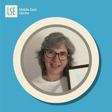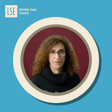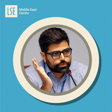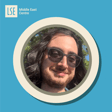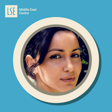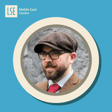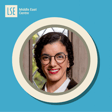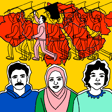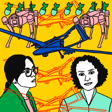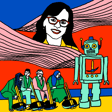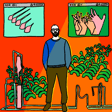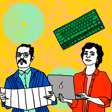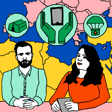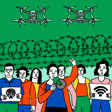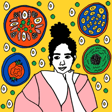Become a Creator today!Start creating today - Share your story with the world!
Start for free
00:00:00
00:00:01

Episode 5: Lucia Ardovini on Gender, Emotions and Interviewing People in Exile
In this episode, Anne Kirstine talks to Lucia Ardovini about her research on the Egyptian Muslim Brotherhood. Lucia talks about how she developed relationships with Brotherhood members in exile and shares her thoughts on how to address ethical issues, biases and colonial heritage in knowledge production.
Lucia is a Lecturer in International Relations at Lancaster University and the Director of the Richardson Institute. Her research focuses on social movements, transnational activism and ideology. She is the author of the book 'Surviving Repression: The Egyptian Muslim Brotherhood after the 2013 Coup'.
Transcript
Introduction to Positionality
00:00:03
Speaker
Hello and welcome to Conversations on Positionality, a podcast brought to you by the LSE Middle East Centre. My name is Anne Kirsten Rohn. I'm a visiting fellow at the Centre and in this podcast I set out on a journey to explore how who we are as researchers shapes the work we do.
Influence of Demographics on Research
00:00:21
Speaker
As Middle East scholars, we're often told to reflect on our personality. How do factors such as our gender, ethnicity, age and personality play out in our relations with people we interview? And to which extent can we shape or influence our role in the field?
Lucia Arduini's Background and Work
00:00:38
Speaker
In today's episode, I delve into these and many more questions together with Lucia Arduini.
00:00:45
Speaker
Lucia is a lecturer in international relations at Lancaster University and a director of the Richardson Institute. Her work looks at social movements, political Islam and state society relations, and last year her book on the Muslim Brotherhood came out. The book is the result of over seven years of research on the Brotherhood's organization and ideology, and more than 100 interviews with leaders, members and former members of the Brotherhood.
00:01:12
Speaker
And one of the reasons I've invited Lucia to this podcast is that I'm very curious to hear what she has learned about her positionality during these years and throughout these interviews. But first of all, I want to say welcome to the podcast, Lucia. Thank you. I'm very happy to be here.
00:01:28
Speaker
Lucia, you have taught me about some of the fascinating interviews and encounters you have had during your research. But before we go into that, I would like to start by asking you the same question I asked to all guests in this podcast.
Concept of Positionality in Research
00:01:40
Speaker
What does the term positionality mean to you?
00:01:43
Speaker
I think that's a good starting point because I feel that our definition and our understanding of positionality evolves over time. So to start with, there are two main ways in which I personally think about positionality and particularly positionality in research.
00:02:02
Speaker
I think about positionality as the acknowledgement and the disclosure of how researchers race, gender, class, experiences, privileges, and other self-identification such as religion, for example, influence their research methods.
00:02:19
Speaker
How do they influence their perspectives, their biases? Because I think we are all in agreement that there is not such a thing as objective or apolitical research, right? So it is our duty as researchers to ask ourselves what biases we have, what privileges we have, where they come from, and how can we account for them?
00:02:44
Speaker
And the second way in which I think about positionality that has been very useful for me throughout my journey is that I think of positionality as being composed by both fixed and fluid elements or characteristics. So we can think about fixed terms of positionality, such as race, gender, nationality as the things that we cannot change.
00:03:08
Speaker
While there are others, such as political views or personal experiences, they inform our positionality but are much more fluid. These are some things that are subjective and contextual, they evolve over time. So I think that this distinction is useful for us to reflect on when we try to identify the characteristics of our own positionality towards a certain subject.
00:03:34
Speaker
I like that you bring up this distinction between the fixed and fluid aspects because this is something I've been thinking of a lot during my fieldwork.
Positionality in Fieldwork Experiences
00:03:43
Speaker
So I was wondering if you could perhaps elaborate a bit on the particular fixed and fluid aspects that you tend to reflect on the most in your fieldwork and also how you came to realise the significance of these aspects.
00:03:57
Speaker
Yeah, sure. I remember when I started fieldwork in 2013 as a PhD student, I wasn't really thinking about these things as much. I was aware of the fixed aspects of my positionality, the fact that I am doing a PhD at a UK university, I have an Italian passport, I can travel quite easily. But it took me actually starting to do the fieldwork.
00:04:23
Speaker
to see how they were shaping my access and my experiences in all the different places across the region where I did my research. So just to contextualize this, I work on Islamic social movements and I look a lot at structure and agency in the context of individual and collective identities. So the positionality of my subjects as well is very important.
00:04:48
Speaker
And ethnography is a central part of my work, so I can't really get away from thinking about positionality in the kind of research that I do. And some aspects that I reflect most upon are my privilege as a European woman with a PhD and most importantly with a passport that allows me to travel everywhere, which is something that a lot of my research subjects don't have access to.
Narrative Responsibility in Research
00:05:12
Speaker
And because of these privileges, because of this positionality, I have the ability and most importantly, I have the power to tell a story, to create a narrative about my work and about the topics that I work on. So something else that is crucial when it comes to positionality for me
00:05:31
Speaker
is that I don't want to center my voice in my work. That is not the main voice that needs to be put across, because mine is not the main experience that is under analysis here. So I try my very best to showcase and to broadcast the voices and the experiences of my research subjects, because they do not have access to the same platforms that I have, and my research will not be possible without them.
00:05:58
Speaker
And then when it comes to the more fluid aspects, I guess, of my positionality, there are things such as my political positioning. For example, something that I do not work on as a choice, even though it's a topic that I'm very passionate about, is Palestine.
Separating Academia and Activism
00:06:15
Speaker
Because that is a huge part of my personal activism, both inside and outside academia. And that is where I want to keep it.
00:06:24
Speaker
because I think that's how I can better serve the cause of Palestinian liberation without blurring that line between what work I produce academically and what I believe in individually, if that makes sense. That does make sense. And I'm curious actually to hear if you can say a bit more about what the implications would be if you blurred that line more.
00:06:49
Speaker
Yes, I don't feel like I could produce objective academic work on Palestine because I spent a lot of time living there. I had friends in Palestine and I have people who I consider essentially like acquired family. And these are all experiences that not only inform my political positioning, but also inform the way in which I emotionally think about the issue.
00:07:17
Speaker
and I would like to hold as clear line as possible when it comes to what I can do through activism and what I can do through academic work.
Addressing Positionality in Interviews
00:07:28
Speaker
I would like to go a little bit back to what you said about your experiences. You've talked about how you reflect on your positionality when conducting research, but I'm curious to know whether you also discuss your positionality with people you interview.
00:07:43
Speaker
Yes, it's kind of the elephant in the room that needs to be brought out of the way at the beginning of a conversation. A lot of this depends on who I'm talking to. So if I'm having an interview or a conversation with a senior leader, for example, our respective positionalities are very clear from the beginning.
00:08:05
Speaker
They normally would assume that I've done my research about the organization and I want to speak to them because they are the voice of the movement and I'm probably not going to find out something that is not already out there.
00:08:21
Speaker
So that sort of conversation is very structured from their side. Well, my experience speaking with ex-Muslim Brotherhood members, women who are part of the Muslim sisterhood and ex-members and the youth is completely different because these are the voices that a lot of people and a lot of scholars are not interested in.
00:08:42
Speaker
These are the people who don't get interviewed, who don't get researched. So they are very keen to get their voices out and I need to make it clear with them that I am not a news reporter. I can try my best to showcase their voices and make sure that their voices are heard within the academic and the policy fields. But I am not, you know, a Twitter whistleblower, which will champion their cause. So their relationships are very different there.
00:09:12
Speaker
I think these experiences that you just highlighted really illustrate quite well how we also learn about our positionality through our encounters with our interlocutors in the field and through the negotiations perhaps that we have about our role vis-à-vis these interlocutors. And this all makes me wonder if you could go back in time to when you started doing your research
00:09:37
Speaker
What advices would you give yourself as for how to become more aware of your positionality and perhaps also tackle the difficult dilemmas that come with that positionality?
00:09:49
Speaker
I think I would tell myself to start reflecting on my positionality before I started the fieldwork, which admittedly is something that I didn't do. And I would also tell myself that it's okay. There are some things about my privileges that dictate my access to people and interviews and countries that I cannot change.
00:10:10
Speaker
I spent some time feeling guilty about it because I mean I work with members in the diaspora who live in forced exile who will never be able to go home again. It was almost a slap in the face in terms of like okay I can come to Jordan and I can come to Istanbul and have this conversation over coffee and then I'm just gonna go back to my life.
00:10:30
Speaker
That's okay, that's part of our positionality and I think the recognizing that is gonna help me and it's gonna help other people make sure that we do justice to our interviewees.
00:10:43
Speaker
What you're saying about the difference between the privileges you have and that your interlocutors have is really interesting. But there's another difference that I also can't help thinking about when looking into your research. And that is the difference between the worldview that you have and the worldview of your interlocutors.
Ongoing Engagement with Positionality
00:11:03
Speaker
So can you tell a little bit about how that difference shapes and plays out in your work?
00:11:10
Speaker
Yes, my worldview and the worldview of the people I speak to, as you said, is very, very different. So the first thing that will come to mind is the fact that I learned that engaging with my positionality is an ongoing process, and it's something that I can never allow myself to stop doing.
00:11:28
Speaker
Something else that I think it's important to keep in mind here is the fact that my positionality and my privilege is not absolute, right? Just because our worldviews are different and just because I am admittedly in a better social, economic, political position in them doesn't mean that we cannot find things that we agree on.
00:11:54
Speaker
or that we cannot find things that it's worth having a discussion about. And that's where the interviews really get deep. That's where the field work really almost runs alongside these points of difference and these points of agreement. And that's when you start having real conversation with people. And that's when you start developing personal relationships as well, which I think is another thing that we need to reflect on as researchers.
00:12:21
Speaker
Our interviewees, they're not disposable, they're people. They have trauma, they have emotions, they have their own experiences. They're not there for us to just hit up when we want to find some more data for a journal article. And Lucia, can you give some examples of how you develop these personal relationships with your interlocutors and what value these relationships bring to your research?
00:12:48
Speaker
Yes, I should say that I haven't developed a personal relationship with all of my interlocutors, but I was lucky enough to meet people who I kept in touch with for years, who I'm still in touch with. Some of them I would consider them friends. And that comes with its own ethical implication in terms of like, okay, you're now not an interviewee anymore. I'm not going to use this particular conversation.
00:13:15
Speaker
But a lot of it came with time. And I think, depending on your audience, these relationships develop in a different way, and they look different as well. Particularly with senior leaders, who, because of my positionality, is a portion of the membership of the Muslim Brotherhood, who I had a lot of difficulty gaining access to. Because I'm a European woman, I am
Challenges and Advantages of Positionality as a Woman
00:13:42
Speaker
young,
00:13:43
Speaker
And I am an atheist who's working on Islamist social movements. So, you know, the Muslim Brotherhood in particular is a very secretive organization who does not like outsiders very much. And as far as outsiders go, I could not be much more. So when trying to establish some sort of rapport with the most senior leadership level of the organization, I was initially not taken seriously. And I wasn't seen as someone who was worth
00:14:12
Speaker
speaking to. I don't even know how many times I sat with senior leaders after I chased them for months, begging them for some time for an interview, and they literally spent our first couple of meetings testing me about the history of the Brotherhood, asking me trick questions, wanting to see how I would react to certain statements and so on, because they didn't take me seriously.
00:14:36
Speaker
And then there was a shift and that's where the relationship started developing when they, after countless meetings, realized that I actually knew my stuff. I had done my research, I had genuine questions, and a lot of them were surprised by that.
00:14:51
Speaker
And this is where I think the line between I'm just here for an interview and the more deep questions that you don't prepare for as a researcher when you go in for an interview with someone sort of really start to kick in. Because that was the point where all of the obstacles that came with my positionality became an asset for me. Once I passed the vetting process, as a woman, I was not perceived as a threat or as someone who could damage the
00:15:21
Speaker
organization and its reputation with my work. And that means that I was able to have conversations about topics that I know most invaluable members and leaders do not even go near when it comes to speaking to male researchers. I had such deep conversations about
00:15:38
Speaker
trauma about the experience of the Raba massacre, about emotions, the experience of settling into the diaspora, processes of self-searching and growths and doubts that I will never have imagined having. I didn't prepare for this conversation, but these are so invaluable. And I think that once you breach these topics,
00:16:02
Speaker
that leads to countless continuous conversations that develop into what is a very strong interpersonal relationship.
00:16:11
Speaker
I think your reflections about being a woman in the fields are really fascinating. And it's not just because I'm a woman myself, it's also because it's somewhat surprising how being a woman has allowed you to gain access in what can be described as the very male-dominated environment. Can you maybe elaborate on how you came to be aware of these assets that come with your positionality as a woman?
00:16:37
Speaker
It took me a long time to realize because I was so focused on gaining access and talking to the people on top of the organization that I didn't realize until I started writing my book that actually a lot of the obstacles that come with my positionality and that made that initial approach to research more difficult became an asset.
00:17:00
Speaker
And that's when I started comparing my data with other people's data and finding out that no one is having these conversations, like no one is talking about these topics. And in retrospect, I think it's because I am a woman and I am young, and it's that element of having to prove yourself as an expert in the organization whose members you are interviewing that sort of acted as a gateway to that.
00:17:26
Speaker
Because that's not an experience that I had when speaking with women. I was only able to speak to women who are part of the Muslim sisterhood because I am a woman.
00:17:37
Speaker
And that, for me, was very clear from the beginning. But this other element took me some time to realize. In the way you describe these personal relations with your interlocutors, it seems like something that is very valuable to you. And something you said which caught my interest was that there were conversations that you deliberately did not consider part of your research.
00:18:03
Speaker
So how do you distinguish between what is data that you can analyze and use in your research and what has to be kept part of your personal relationship with these individuals?
Ethics and Consent in Research
00:18:15
Speaker
This is a very good question and it's also something that I had to spend a lot of time thinking about when I was writing my book. And there are a lot of things that I kept out of my book. Something that I made part of my practice is that if I decide the reporting on the context or the content or of
00:18:39
Speaker
a specific conversation with someone, regardless of whether this was formal or informal, I reach out to them. I ask them, can I use this? Is it okay if I phrase it in this way? I give them the chance to think about it, and I give them the chance to say no. And if they say no, that's something that I will never put in writing.
00:19:03
Speaker
So having this constant meta-dialogue with your interlocutors is, you know, for you the key to keeping these two things separate, the personal relationship and the research interaction. Yeah, because I think that that's absolutely crucial. That comes with our positionality as researchers that are based in the West, right? I think it's our duty to make it very clear that we are studying and analyzing and writing about
00:19:30
Speaker
someone else's experiences and someone else's perceptions and what they choose to share in a specific moment, they might not feel that way six months down the line. And that's our duty to check on that. So something that has been very clear throughout this conversation so far is the responsibility of researchers to really be aware of that positionality, really be careful to reflect on it.
00:19:59
Speaker
and use these reflections to improve their research. And before we started this podcast recording, you said that you believe conversations on positionality should play a bigger role in academia and that we should have more of them. So I'd like to ask you, because we're nearing the end of the podcast, what conversations on positionality do you think are missing so far in academia?
Call for Broader Positionality Discussions
00:20:23
Speaker
I think it's worth starting by saying that we weren't having these conversations five or ten years ago, right? So we are already moving in the right direction, but there is so much more work that needs to be done. I think the first thing that needs to start being included in conversations about positionality specifically in this field is that we need to start thinking about our research subjects more.
00:20:49
Speaker
Specifically, when we're working on particular communities or groups of people that have been the subject of research for so long that they are completely burnt out by it. They don't want to engage with it anymore. They don't believe that anything is going to come out of it. They don't want to be treated as research subjects anymore. That's something that we really need to start taking into account.
00:21:15
Speaker
And similarly, I think that we need to start thinking and talking about the positionality of our interviewees and of people in the region as well, specifically when it comes to research and to the production of knowledge, which is not a one-way street.
00:21:32
Speaker
So, you know, in Western academia, there are now plenty of debates on how we have historically studied the Middle East and its people. There are discussions around biases about colonial heritage, the legacy of external intervention and so on. But what about the other side?
00:21:50
Speaker
What about the positionality of people and of scholars in the region? How do they think about the West? How do they teach their students about the West? What are their narratives and their biases? How do they grapple with the legacy of colonialism and imperialism and so on?
00:22:07
Speaker
I really think this needs to become part of the debate more, especially as we are moving towards a new version of academia that is increasingly focusing on post-colonial and decolonial debates. But again, that's a process. We are not there yet. And I think that including this kind of conversations will benefit us as researchers and the field as a whole.
00:22:29
Speaker
So I know you're teaching different courses and I'm curious to hear how you address these issues of positionality in your interaction with students.
00:22:41
Speaker
The first thing that I always tell my students is to question everything, including what I teach them. Especially when I teach courses on international relations, I start with the origins of the discipline, I start with Eurocentrism, I start with the white man's burden, and I try to show them from the very beginning how this discipline was created, by whom it was created, and for whom.
00:23:09
Speaker
Because that immediately gets them to start questioning it. That immediately gets them to start thinking about, okay, but what are the implications here? What are the voices that are not only part of the discussion now, but were not being part of the discussion from the very beginning? And, you know, we might not call it positionality as such, but that's part of that process. So that's how I try to address it in the classroom. And some people like it, some people hate it, but you can't please everyone.
00:23:39
Speaker
What do you find hardest to convince your students about when you have these conversations? A lot of people ask the question of, then what? If we look at international relations and we see the discipline is, say, flawed or tainted from the very beginning, then why are we studying it? Like, what's the point?
00:23:59
Speaker
And that's a big challenge because you need to convince them that there is still value in that. There is still value in the theories and the approaches that we have developed since the beginning of the 20th century. It's a matter of making them more inclusive and using them to shape a worldview that takes into account different voices and different histories and different experiences. But the question of then what comes up a lot.
00:24:27
Speaker
So I'm afraid we'll have to end the conversation here, but before we do so, I just want to say thank you again, Lucia, for sharing your experiences and thoughts from your research. It's been fascinating listening to. Thank you for having me. This was great. And that was all I had for this episode of Conversations on Positionality. Thanks to the team at the LSE Midley Centre for their work on the podcast, and thank you to the listeners for tuning in.
00:24:53
Speaker
In the next episode, I continue the conversation together with Serhon El from Izmir University of Economics. Serhon's research looks into Kurdish movements and nationalism, and one of the things I'll discuss with him is how he defines his role as a researcher when studying such a sensitive and divisive topic. I hope you're listening.
